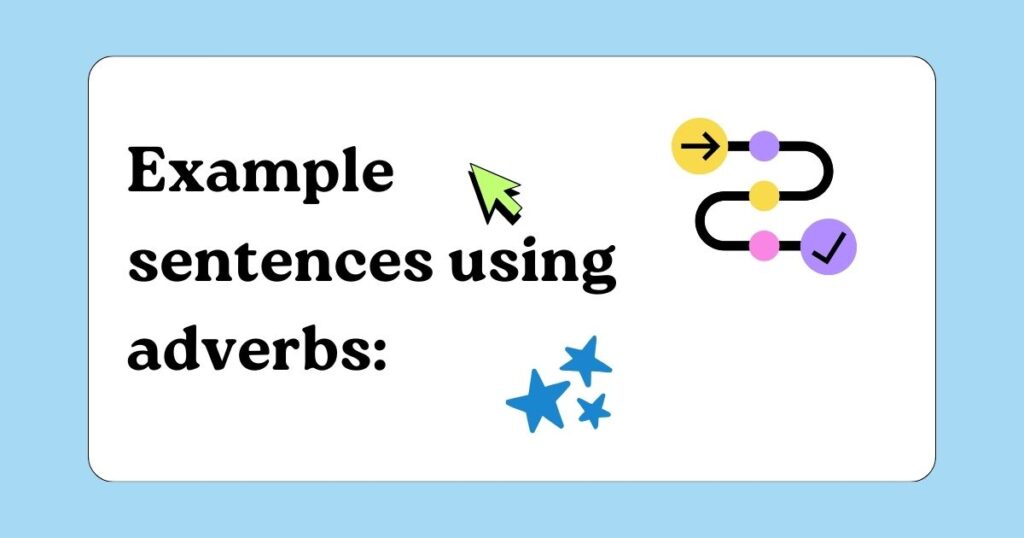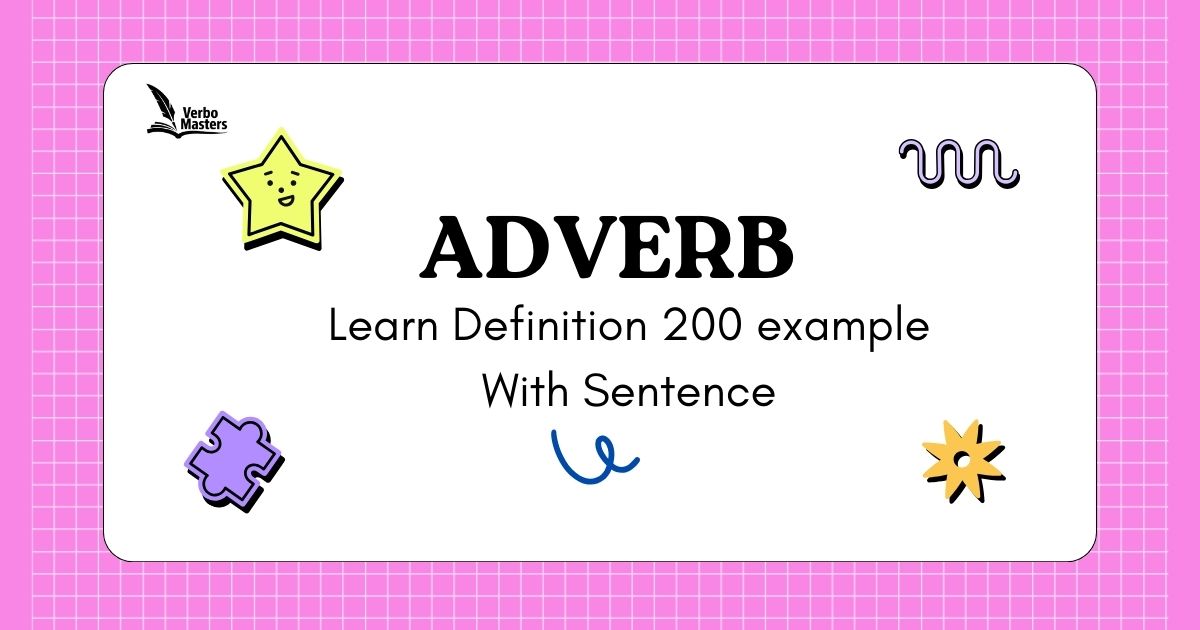Adverbs are words that describe or modify verbs, adjectives, or other adverbs. They tell us how, when, where, or to what extent something happens. For example, in the sentence “She sings beautifully,” the adverb “beautifully” describes how she sings. Adverbs can also show time, like “He will arrive tomorrow.”
Understanding adverbs is key to adding more detail and depth to your sentences. They can change the meaning of a sentence and make it more specific. In this guide, we’ll explore 200 example sentences that show how adverbs work in different contexts, helping you understand their usage better. Whether you’re writing or speaking, mastering adverbs will improve your communication.
Learn Adverb Definition: 150+ Useful Adverbs
An adverb is a word that modifies or describes a verb, adjective, or another adverb. It provides more information about how, when, where, or to what degree something happens. For example, in the sentence “She runs quickly,” the adverb “quickly” tells us how she runs.
You can also read; 150 Verb Example Sentences
Adverbs play a crucial role in enriching sentences by adding detail and clarity. They can show time, frequency, manner, or place, making the communication more specific. Here’s a list of 150+ useful adverbs to enhance your vocabulary and improve your writing or speaking skills.
150+ useful adverbs to enhance your vocabulary and improve your communication:
- Quickly
- Slowly
- Loudly
- Softly
- Carefully
- Happily
- Sadly
- Never
- Always
- Usually
- Frequently
- Rarely
- Often
- Seldom
- Constantly
- Absolutely
- Totally
- Definitely
- Clearly
- Easily
- Hardly
- Completely
- Exactly
- Nearly
- Truly
- Sometimes
- Forever
- Yesterday
- Today
- Tomorrow
- Soon
- Later
- Here
- There
- Everywhere
- Nowhere
- Anywhere
- Somewhere
- Elsewhere
- Inside
- Outside
- Above
- Below
- Around
- Forward
- Backward
- Together
- Apart
- Meanwhile
- Immediately
- Gradually
- Instantly
- Quietly
- Suddenly
- Eventually
- Recently
- Always
- Normally
- Occasionally
- Continuously
- Completely
- Fortunately
- Unfortunately
- Surely
- Just
- Only
- Exactly
- Incredibly
- Amazingly
- Absolutely
- Really
- Seemingly
- Practically
- Honestly
- Perfectly
- Virtually
- Likely
- Unlikely
- Steadily
- Gradually
- Effectively
- Differently
- Better
- Worse
- Far
- Close
- Precisely
- Reluctantly
- Willingly
- Independently
- Unquestionably
- Generally
- Naturally
- Uncertainly
- Temporarily
- Simultaneously
- Directly
- Intimately
- Actively
- Passively
- Formally
- Loudly
- Sharply
- Warmly
- Coolly
- Carefully
- Forcefully
- Steadily
- Swiftly
- Happily
- Sadly
- Largely
- Tiny
- Majestically
- Fiercely
- Softly
- Heavily
- Politely
- Honestly
- Wisely
- Uncertainly
- Surprisingly
- Normally
- Barely
- Completely
- Broadly
- Wildly
- Perfectly
- Timidly
- Tightly
- Brightly
- Flashily
- Cheerfully
- Briefly
- Deeply
- Truly
- Vividly
- Artfully
- Smartly
- Boldly
- Spontaneously
- Positively
- Instinctively
- Diligently
- Easily
- Cautiously
- Openly
- Exceptionally
- Repeatedly
- Exceedingly
- Irregularly
These adverbs will help you convey your ideas more precisely, whether you are describing how something is done or the manner in which events unfold.
Example sentences using adverbs:

50 example sentences using adverbs to showcase how they modify verbs, adjectives, and other adverbs:
- She ran quickly to catch the bus.
- He spoke loudly to be heard over the noise.
- They answered the questions carefully.
- The children played happily in the park.
- She smiled softly as she walked by.
- He works hard every day.
- The dog barked loudly at the mailman.
- She sings beautifully in the choir.
- He was extremely tired after the long hike.
- They arrived early to secure the best seats.
- She can easily finish this task.
- He spoke slowly so everyone could understand.
- They ate quickly because they were late.
- The room was unusually quiet that evening.
- He answered honestly when asked about his work.
- She runs faster than anyone on the team.
- They traveled far to visit their family.
- The team played together all season long.
- The wind blew strongly through the trees.
- He arrived late for the meeting.
- The students worked diligently on their projects.
- The baby slept peacefully in her crib.
- She completed the project successfully.
- They met frequently to discuss their ideas.
- The teacher spoke calmly during the storm.
- She laughed loudly at the joke.
- The train is running on time today.
- He behaved recklessly during the party.
- The cat jumped gracefully over the fence.
- The fireworks exploded brilliantly in the sky.
- He worked tirelessly on his presentation.
- The soup was incredibly hot.
- The children played outdoors all afternoon.
- They laughed heartily at the comedian’s jokes.
- She danced beautifully at the recital.
- He answered repeatedly until everyone understood.
- She spoke with confidence during the interview.
- He passed the test easily.
- She looked sadly at the empty chair.
- They went to the beach last week.
- The book was extremely interesting.
- He turned away slowly from the scene.
- She spoke too softly for anyone to hear.
- The actors performed enthusiastically on stage.
- He responded immediately to the email.
- She sang beautifully in the concert.
- They celebrated happily after the big win.
- The car stopped abruptly at the red light.
- He answered without hesitation.
- The team practiced consistently to improve their skills.
FAQs
What is an adverb?
An adverb is a word that modifies a verb, adjective, or another adverb. It provides more information about how, when, where, or to what extent something happens.
How do adverbs modify verbs?
Adverbs modify verbs by providing details about the action. For example, in “She runs quickly,” the adverb “quickly” explains how she runs.
Can an adverb modify an adjective?
Yes, adverbs can modify adjectives to tell us more about the adjective. For example, in “She is extremely talented,” the adverb “extremely” modifies the adjective “talented.”
Can adverbs modify other adverbs?
Yes, adverbs can modify other adverbs. For example, in “She sings very beautifully,” the adverb “very” modifies the adverb “beautifully.”
What are the different types of adverbs?
Adverbs can describe manner (how), place (where), time (when), frequency (how often), and degree (to what extent). For example, “She sings beautifully” (manner), “He goes there often” (frequency), “She arrived early” (time).
How do adverbs affect the meaning of a sentence?
Adverbs add specific details to sentences, making them more descriptive. For example, changing “She runs” to “She runs quickly” gives more context to the action.
Can adverbs be placed anywhere in a sentence?
While adverbs can often be placed in different parts of a sentence, their placement usually depends on what they are modifying. For example, “She always arrives early” or “Always, she arrives early.”
What are some common adverbs of frequency?
Common adverbs of frequency include “always,” “usually,” “often,” “rarely,” and “never.” They tell us how often something happens.
How do adverbs of degree work?
Adverbs of degree describe the intensity or extent of an action, adjective, or another adverb. Examples include “very,” “extremely,” “quite,” and “almost.”
Can you use adverbs to compare actions?
Yes, adverbs can show comparison. For example, “She runs faster than him,” where “faster” is the adverb comparing the speed of two actions.
Conclusion
Adverbs are words that provide more information about how, when, where, or to what extent an action occurs. They help make sentences more detailed and interesting. For example, the sentence “She sings beautifully” uses the adverb “beautifully” to describe how she sings.
By using adverbs, you can make your writing clearer and more expressive. They allow you to convey precise details, such as the manner of an action, its timing, or its intensity. Mastering adverbs can improve both your spoken and written communication, making it more vibrant and descriptive.

I’m John Smith, a language enthusiast dedicated to helping writers, students, and professionals master the art of clear and effective communication. Whether you’re looking for grammar tips, writing guides, or common mistake corrections, you’ll find valuable insights to improve your language skills. Let’s make grammar simple and fun!

